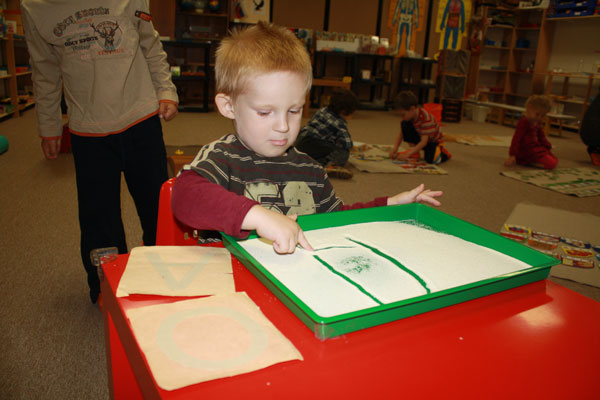 [/media-credit]
[/media-credit]
Then you’ll also quickly realize that it deserves its reputation as one of New York City’s best early-education establishments.
Maksim Kondrukevich and Varvara Radimushkina, the Russian couple in charge of Gold Material’s administration and teaching methods, started off with a branch of the school in Brooklyn’s Bensonhurst neighborhood five years ago. Their East Village location opened up on Oct. 12 and a third location opened in Gramercy on Nov. 18.
“We really emphasize connection and association because children usually learn by association,” Radimushkina said. “The parents are really happy with what we’re doing. They believe we have the best school in Brooklyn.”
While the Bensonhurst branch has a mostly Russian demographic of children, who receive lessons in their native language to promote a bilingual advantage, there are also children from mixed-race families, among others.
The toddlers at these Montessori schools receive an unparalleled learning experience that can start as early as 2 years old and run through age 6. The student-teacher ratio is typically 8 to 1 and the Avenue B school hopes to reach its capacity of 30 students.
Instead of stacks of spiral notebooks and file cabinets lined up against the walls, wooden boxes of counting cubes and alphabet letter cutouts are used for a tactile approach to learning. A plastic tray filled with turquoise sand is provided to let the children trace their letters. Wooden boards with sandpaper stencils of every consonant and vowel also aid in helping the children become familiar with the contours of each character. Containers of blue, red, green, and yellow wooden blocks in a variety of shapes are used to introduce size and order concepts.
Before becoming fully enrolled, a child is required to go through a trial period, which can last up to a week.
“We want to make sure we’ll be able to work with the child and we gauge that by seeing if he responds to his parent’s orders,” Kondrukevich explained.
Each day starts off with a 10-to-15 minute circle time during which the kids are led by the teacher in a discussion about what’s happening — what the weather’s like that day, if anything unusual occurred on the children’s way to school and so on.
“It’s a child-initiated process,” said Kondrukevich. “The teacher doesn’t really decide anything and just provides the necessary materials for instruction.”
Montessori schools were not introduced to Russia until 1995, when the methods started being incorporated by German teachers. Maksim developed an interest in child education from his mother, who has spent decades in the field and was nominated in 2000 for a teaching award.
“Almost all of our students pass the gifted-and-talented exams and can go on to any private school in the city,” said Radimushkina. “Sometimes, they can skip first grade.”
“It’s all about engaging the children,” added Kondrukevich. “We assess the child’s level to give them a challenging task, but nothing too hard that they become discouraged.”
During snack time, the teacher serves each child the same snack to create an environment of equality so that they learn to respect each other. Andrew, the couple’s 3-year-old son, attends the Montessori school in Brooklyn, where he’s made close friends with the other toddlers. The young pupils even attend each other’s birthday parties.
When it comes to the type of education offered in the city’s public schools, Maksim and Varvara aren’t impressed.
“The teachers are used to observing children but not putting effort into the educational process,” Kondrukevich said. “People perceive a school education as a safe environment and nothing else.”
“We want to have a network of schools in New York City,” Radimushkina stated.
For more information on Gold Material’s tuition and year-round hours, parents can visit www.goldmaterial.com.
































